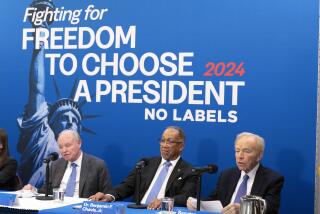Clinton Tax Attack on Brown Boomerangs : Democrats: Arkansas governor demands release of tax returns, but his own are not yet public. Brown says his are ‘out there,’ but aides later deny it.
- Share via
NEW YORK — Bill Clinton called on former California Gov. Edmund G. (Jerry) Brown Jr. on Saturday to publicly release his tax returns, but the attempt to embarrass his rival for the Democratic presidential nomination was muted after aides acknowledged that the Arkansas governor had not released any of his own returns since declaring his candidacy.
Brown, responding to Clinton’s challenge, declared that his own tax records were already “out there.” But Brown aides later said his tax returns have not been made public. They also said they did not know if Brown now intends to release them.
Clinton’s challenge to Brown was aimed at showing that his foe, who portrays himself as a candidate of the people, is a wealthy man who would benefit from his proposal to replace the existing federal tax structure with a flat-tax system. Brown’s plan calls for a 13% tax on personal income and a 13% value-added tax on manufactured goods, which some say would amount to a national sales tax.
The gambit by the Arkansas governor was also clearly intended to force Brown to share some of the scrutiny that has left Clinton’s own presidential campaign embittered and defensive. “Let’s treat him like a real presidential candidate,” Clinton deputy campaign manager George Stephanopolous said bluntly.
But the confused way in which the challenge was executed seemed to reflect the anxiety of a Clinton campaign determined to find a way to blunt the unexpectedly strong challenge from Brown.
Clinton made public his tax returns covering the years 1983 to 1989 during his 1990 gubernatorial campaign, and aides to his presidential bid initially said he had recently made public his 1990 returns as well. But the officials later acknowledged that was a mistake. Aides at his campaign headquarters in Little Rock were still trying to assemble those records Saturday night.
The Arkansas governor issued his call after he was forced to curtail an appearance at a Harlem hospital when Lenora B. Fulani, running for President as a candidate of the New Alliance Party, and a small group of supporters interrupted his remarks with a vocal and prolonged demonstration.
Fulani accused Clinton of insensitivity to the black community, a criticism that has been directed at him by others since he played a round of golf last week at a country club in Little Rock with no black members. Clinton has since apologized several times for playing at the club and vowed not to do so again until it is integrated.
The demonstration by Fulani and her supporters clearly left Clinton and his aides angry and frustrated, as what had been intended as a show of his commitment to health care and racial unity was overshadowed by images of conflict.
In setting his sights on Brown with the tax-return issue, Clinton moved a further step away from the general-election focus his campaign had begun to adopt only a week ago. Those efforts were shelved when Brown upset Clinton in last Tuesday’s Connecticut primary. Brown’s victory focused renewed attention on New York’s April 7 Democratic primary, as well as the Wisconsin primary on the same day.
In other developments Saturday, Clinton picked up another national convention delegate as Democrats caucused in the Virgin Islands. He received support from 42% of the 300 party members participating in the gathering. The “uncommitted” category was backed by 58%, netting two delegates.
Clinton now has an estimated 988 convention delegates, with 2,145 needed for the nomination. Brown has an estimated 150 delegates.
Despite Clinton’s big lead, he and his advisers fear that a strong showing by Brown in the New York and Wisconsin primaries could throw the Democratic race into turmoil. As a result, they have sought to prod the press and public to begin to subject Brown to more rigorous scrutiny.
With that in mind, Clinton raised the issue of Brown’s financial status during an appearance at a Queens restaurant. Blasting his rival’s flat-tax proposal as one that would benefit the rich, Clinton said: “I bet Jerry Brown would make a lot of money out of his tax plan. He ought to release his tax returns and we can see.”
Brown, meanwhile, stoutly defended his plan during an appearance in New York City and contended that Clinton is lying when he says the tax proposal would place an unfair burden on the poor and middle class while benefiting wealthy Americans.
“That’s a big lie,” Brown told a crowd estimated at several thousand at Union Square in Lower Manhattan. “He attacks a program that simplifies the tax structure and makes it as fair and as equitable and as simple as possible. That is the issue: the big lie of Clinton or a tax system that will work for every American.”
To symbolize his efforts to reform the national tax system, Brown held up a volume of the Tax Code. “If you like the present Tax Code and the elite that maintains it, then you vote for Clinton, you vote for Bush,” Brown said, pitching the heavy leather-bound book into a battered trash can on the platform. “But if you want to take this stuff and throw it into the garbage can, you vote for me.”
Asked by reporters to respond to Clinton’s challenge that he release his tax returns, Brown said he had already done so. “It’s out there,” he said of his tax records, while providing no other details.
His aides contradicted Brown several hours later after the campaign arrived in Wisconsin. Brown could not be reached for further comment late Saturday night.
In New York, the Brown campaign launched a fresh attack on Clinton with a television ad that criticizes his gubernatorial record. Part of the ads says: “While Bill Clinton plays golf at a restricted all-white club, Arkansas remains one of only two states with no civil rights act.”
The ad concludes: “Now that’s slick, but we want real change.” This portion of the ad shows Clinton sitting in a golf cart, an image that then is shrunk to golf-ball size. As a loud whack is heard, the ball flies off the screen.
The ad does not mention that Clinton sought to pass a state civil rights bill but has been rebuffed by the Arkansas Legislature.
Clinton insisted he was unperturbed by the disruption caused by Fulani at the Harlem hospital. Fulani had positioned herself and a small group of supporters among the audience waiting for Clinton in an auditorium.
After Clinton began to speak, Fulani stood on a chair to shout her complaints that the Arkansas governor had paid too little heed to black issues and prevented minor Democratic candidate Larry Agran, the former mayor of Irvine, from participating in candidate debates.
Clinton tried several times to speak, protesting that he had urged that Agran and other minor candidates be included in such forums. But each time, he was shouted down by Fulani and her supporters as hospital officials complained in vain that the noise was disturbing patients on the floor.
A triumphant Fulani said she regarded the tactic as a success because she had intended that it be “impactful.”
For his part, Clinton said later, “I love people in New York. . . . They say what’s on their mind.”
More to Read
Get the L.A. Times Politics newsletter
Deeply reported insights into legislation, politics and policy from Sacramento, Washington and beyond. In your inbox twice per week.
You may occasionally receive promotional content from the Los Angeles Times.









